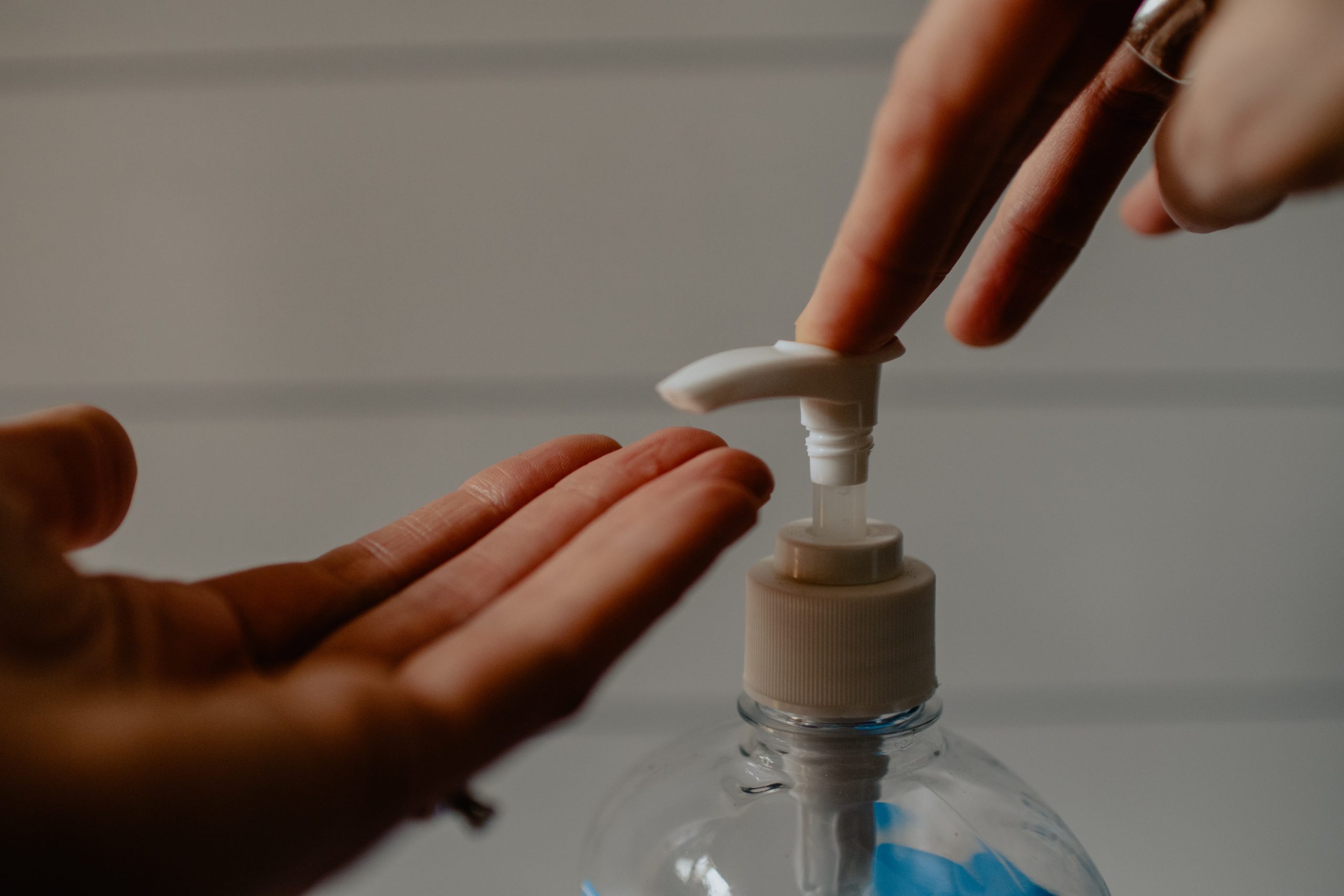This account discusses how to use hand sanitizers safely. You will also get to know about hand sanitizer facts.
Since our childhood, we have been taught to wash our hands regularly with soap and water to avoid the transmission of germs. With time, the humble soap and water were replaced by smart sanitizer that can be used anywhere conveniently. Dab a few drops on your palm, rub, and you are done. Quick and simple. But what about the safety? Have we ever given a thought to how safe it is to use a hand sanitizer so frequently? Let’s do it now.
Know Your Hand Sanitizers

Germs are everywhere. Whatever we touch contains some and then transferred to other surfaces. To avoid the risk of falling sick as a result, we must keep our hands clean. If soap and water are not readily available, hand sanitizers come into the scene that check the spread of germs and curtail the risk of getting sick.
However, no matter how safe sanitizers seem to be, you have to be watchful for hand sanitizer poisoning symptoms. Hand sanitizers that contain Triclosan- a synthetic element added to antibacterial products must be avoided.
If you are exposed to a high dose of Triclosan, bacteria might resist the antibiotics, decreasing some thyroid hormones. Lab studies from the Centers for Disease Control and Prevention (CDC) have also shown that sanitizers having 60% ethanol and 70% isopropanol can disable viruses genetically related to COVID-19. However, hand sanitizers may not remove harmful chemicals such as pesticides and heavy metals like lead. Here comes the importance of hand wash.
Uses of Hand Sanitizers

Uses of a hand sanitizer are many. Since the outbreak of the Coronavirus pandemic 2020 and its second wave in 2021, hand sanitizer uses have increased immensely. However, you shouldn’t overdo it. We must know when to use hand sanitizers and when to wash hands.
You can help check the spread of the COVID-19 pandemic by washing your hands properly with soap and water. Most especially after using the washroom, before eating, after coughing, sneezing, or blowing your nose. But don’t replace soap with hand sanitizers. Use alcohol-based hand sanitizers, if soap and water are not available.
If you are wondering, why is it important to wash your hands, know that washing hands can kill some germs better. When your hands are visibly soiled, washing with soap and water is the only approach to be cleaned of germs and grime. Soap and water can more effectively clean certain kinds of germs like norovirus, Cryptosporidium, Clostridium difficile, and chemicals.
With soap, all types of germs can be removed whereas sanitizer can kill certain skin germs. Use sanitizers only in situations of utmost necessity, although it can reduce germs in an instant. The most suitable way to use sanitizer is to take a dime size of sanitizer and rub it all over your hands, covering your fingers, in between, and back. Never rinse or wipe the sanitizer.
Hand Sanitizer Facts
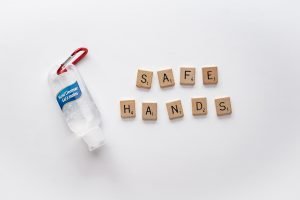
Hand sanitizer is no less than a portable weapon to fight infectious diseases and especially the wretched COVID – 19. Before proceeding, let’s have a look at the facts of hand sanitizers –
- Hand sanitizer isn’t an alternative to soap.
- Hand sanitizers don’t work equally on all germs.
- The most effective hand sanitizers are those having 60-95% alcohol.
- There is a right and wrong way to use hand sanitizer.
How to Use Hand Sanitizers?
Let’s have a look at the uses of hand sanitizer and how we should use it. Also, take a glance at the correct way to wash hands.
Hand Sanitizer

- Use an alcohol-based hand sanitizer.
- Dab enough sanitizer on your palms to cover it, fingers, and even the back of your hands.
- Rub your hands for 20 seconds until the sanitizer dries.
Soap and Water

- Wet your hands with clean lukewarm or cold water.
- Lather soap on your hands and rub as you apply moisturizer.
- Make sure to run the soap between your fingers and under your nails.
- Hum the “Happy Birthday” song twice while doing this, so that soap gets to kill germs for enough time.
- Rinse your hands with clean water.
- Pat dry with a clean towel/cloth or air dry.
What to Look for in Hand Sanitizers?
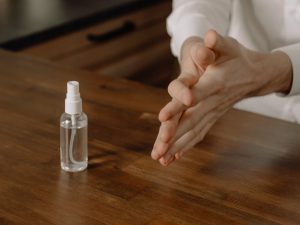
The market is packed with a wide variety of hand sanitizers. It is noteworthy that all hand sanitizers are different. As per the CDC, you should go for a hand sanitizer with at least 60% alcohol. Though many are available between 60% and 95% alcohol content, don’t consider the higher alcohol content with more effectiveness. That is not the case. For maximum effect, sanitizers should have some water content as well.
Some sanitizers contain very little alcohol and don’t protect you adequately. Sanitizers that don’t contain alcohol are weak at killing germs and can be harmful as well. Non-alcoholic sanitizers are so ineffective that germs can resist them.
Dangers of Hand Sanitizers
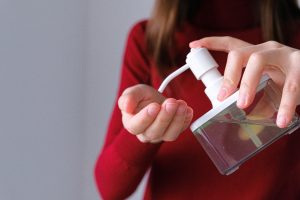
While using sanitizers, it should be kept in mind that they are to be used only topically. You must know how to avoid poisoning by hand sanitizer. These should not be ingested in any case as this can result in alcohol poisoning. However, if kids eat after a few minutes of using hand sanitizer, there is no need to worry.
During the COVID – 19 pandemic, there was a steep rise (almost by 46%) in the numbers of calls that poison control centers have received. All because of accidental swallowing of hand sanitizer. So, you must know what some of the hand sanitizer poisoning symptoms are. During those times, many calls were about kids that were 5 years old and even younger. So, you should monitor the usage of hand sanitizers by your kids.
Kids are attracted to bright, colorful, nicely packed, and fragrant sanitizers. And chances of them swallowing these bottles of liquid are many. To avoid this, store hand sanitizers out of the reach of children. To lessen hand sanitizer dangers among kids, use child-resistant caps on sanitizer bottles.
DIY Hand Sanitizer is a No-No
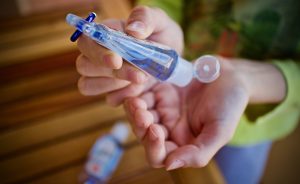
There are times when people look for a hand sanitizer recipe and resort to making a hand sanitizer on their own. Stop. Don’t follow the practice. Medical associations of high repute disapprove of DIY hand sanitizers. Such sanitizers are ineffective and can even result in burning the skin.
Also, refrain from the idea of adding alcohol to non-alcoholic sanitizer to make it more effective. Usually, people try to find out how to make hand sanitizer and use a DIY one. Stop. Don’t do this.
There are instances when people spray disinfectants and use these wipes on the skin. This irritates your skin and if the spray enters your eyes, it can be worse. Remember that disinfectants are meant to clean surfaces, not human beings.
Medical associations like JIMA and FDA are investing their efforts to make sanitizers all the more easily available in the market and avoid and shortage. They are working with pharmacies to address the same.
Health care professionals and patients should be watchful of any hand sanitizer poisoning symptoms. And report any side effects of using sanitizers to the government-recognized medical authorities/associations.
Things to Remember about Hand Sanitizer Safety

- Carefully read the warnings and the drug facts labels on the hand sanitizers.
- As sanitizers are flammable, store these away from heat, flames, and even sunlight.
- Ensure that you have dried your hands after applying the sanitizer when performing activities that involve heat, open flames, static electricity, and sparks.
- Never flush recalled/expired hand sanitizers or pour down the drains. If possible, dispose off these in waste containers.
Hand Sanitizers at a Glance
Do’s
- Use hand sanitizer if you can’t use soap and water.
- Rub in your palms and fingers thoroughly for 20 seconds.
- Store in a cool, dry place.
- Keep out of children’s reach.
- Always use a hand sanitizer of a good brand.
- Carefully dispose of expired/recalled sanitizer.
Don’ts
- Make your own.
- Rinse or wipe it.
- Replace with hand wash.
- Touch your eyes, nose, or mouth after use.
- Leave hand sanitizers in the car.
- Handle sparks/flames after use.
In a nutshell, weigh the risks of using a hand sanitizer yourself. Where there are several benefits of hand sanitizer, there are certain drawbacks too if not used correctly. Check the shelf life, warnings, and follow the directions on its labels. Use as mentioned and stay germ-free. Also, follow the recognized medical authority guidelines about the hand sanitizer’s use. As germs keep waiting for an opportunity to cause health hazards, be thorough.

